Classical music festivals celebrate and preserve musical traditions while fostering community engagement and cultural exchange. They significantly impact local economies through tourism and job creation. Prominent festivals showcase diverse performances and offer immersive experiences that connect audiences with classical music. However, challenges such as declining attendance and competition require adaptation and innovation to remain relevant in modern society.
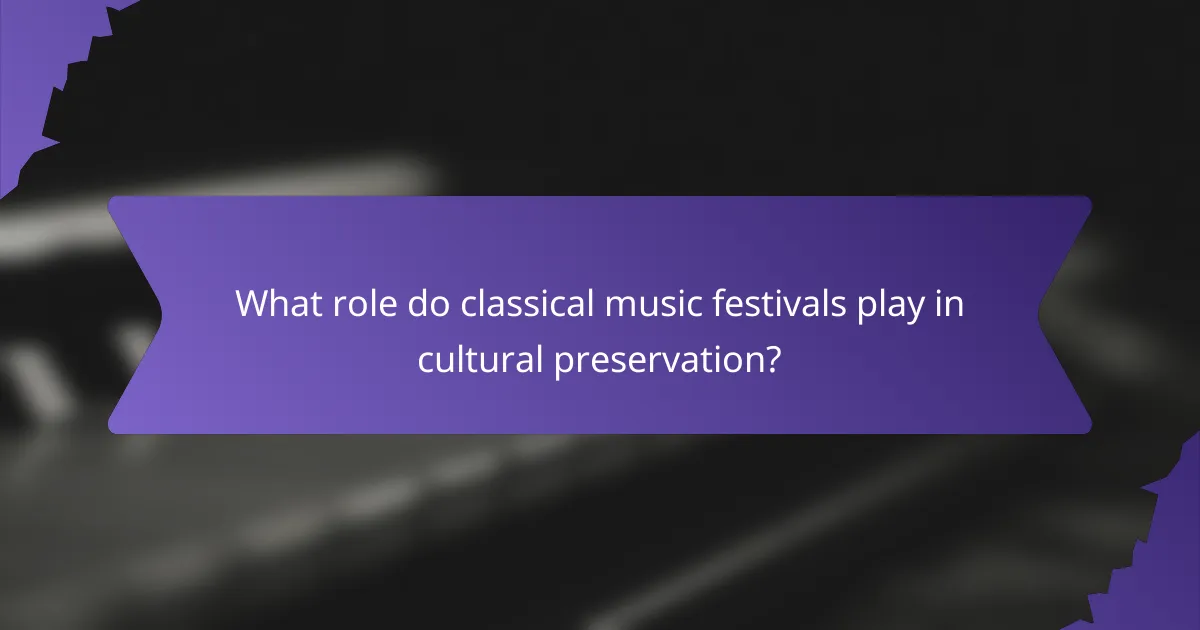
What role do classical music festivals play in cultural preservation?
Classical music festivals play a crucial role in cultural preservation by celebrating and promoting classical music traditions. These festivals often feature performances of historical works, fostering appreciation for composers and styles from various eras. They serve as platforms for educating audiences about classical music’s significance in cultural history. Furthermore, festivals often encourage the participation of young musicians, ensuring the continuity of classical music practices and techniques. By bringing diverse communities together, they enhance cultural exchange and understanding, reinforcing the relevance of classical music in contemporary society.
How have festivals evolved to reflect changing musical tastes?
Classical music festivals have evolved significantly to reflect changing musical tastes by incorporating diverse genres and modern interpretations. Initially focused on traditional performances, these festivals now feature contemporary compositions and collaborations with popular artists. This shift attracts broader audiences and promotes inclusivity. For example, the integration of electronic elements and world music influences showcases the adaptability of classical festivals, ensuring their relevance in today’s cultural landscape. As a result, these events foster a dynamic environment where classical music is reimagined and celebrated in innovative ways.
Which festivals are considered foundational in classical music history?
Foundational festivals in classical music history include the Salzburg Festival, Bayreuth Festival, and the Edinburgh International Festival. These events significantly shaped the classical music landscape through their unique programming and cultural impact.
The Salzburg Festival, established in 1920, is renowned for its opera, drama, and concert performances, attracting top artists. The Bayreuth Festival, founded in 1876, focuses on the works of Richard Wagner, emphasizing a distinct aesthetic experience. The Edinburgh International Festival, launched in 1947, showcases a diverse range of classical music, fostering innovation and international collaboration.
These festivals represent key milestones in classical music, highlighting its evolution and ongoing relevance in contemporary culture.
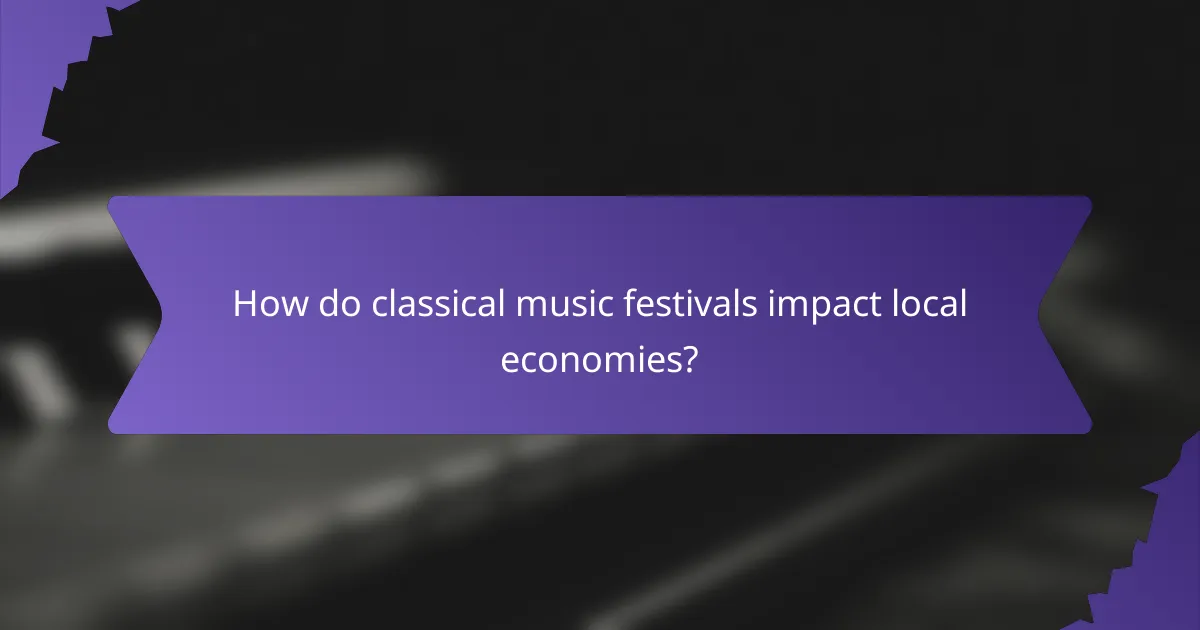
How do classical music festivals impact local economies?
Classical music festivals significantly boost local economies through tourism, job creation, and cultural engagement. These events attract visitors, increasing spending in hospitality, retail, and transport sectors. For example, a study found that festivals can generate millions in revenue, benefiting local businesses. Additionally, they create temporary and permanent jobs, enhancing community employment. The cultural prestige associated with these festivals can also lead to long-term economic development, as cities gain recognition as cultural hubs.
What are the financial benefits for host cities?
Classical music festivals offer significant financial benefits for host cities. These events boost local economies through increased tourism, hospitality spending, and job creation.
Tourists attending festivals contribute to various sectors, including hotels, restaurants, and local attractions. For example, a festival can attract thousands of visitors, leading to a surge in demand for accommodation and dining options.
Moreover, festivals often create temporary jobs, from event staff to vendors, supporting the local workforce. Additionally, they can enhance the city’s cultural profile, attracting future events and investments.
In summary, classical music festivals provide host cities with economic stimulation, increased employment opportunities, and long-term cultural benefits.
How do festivals influence tourism in their regions?
Classical music festivals significantly boost tourism by attracting visitors, enhancing local economies, and promoting cultural exchange. These events create opportunities for local businesses and artists, driving economic growth. For instance, the Salzburg Festival draws around 250,000 attendees annually, showcasing the festival’s impact on regional tourism. Additionally, festivals often highlight the unique attributes of their locations, such as historical venues and local cuisine, further enriching the visitor experience.
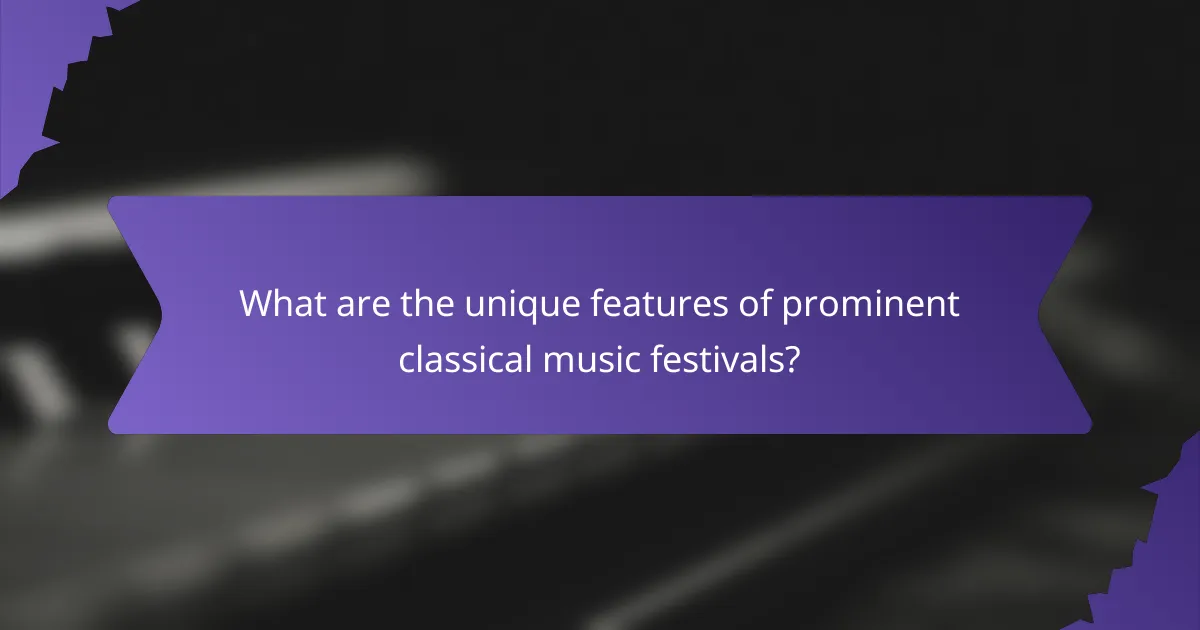
What are the unique features of prominent classical music festivals?
Prominent classical music festivals feature unique attributes that enhance their cultural significance. These festivals often showcase a diverse range of performances, highlighting both established and emerging artists. Additionally, they provide immersive experiences through masterclasses, workshops, and discussions, fostering community engagement. Festivals like the Salzburg Festival and Tanglewood Music Festival stand out for their historical importance and contributions to the classical music canon. Many festivals emphasize specific themes or styles, such as contemporary works or regional music traditions, enriching the overall experience for attendees.
How does the programming differ among major festivals?
Classical music festivals vary in programming due to their historical context, cultural significance, and modern adaptations. Major festivals like Salzburg and Bayreuth focus on specific composers or themes, while others like Tanglewood feature diverse repertoires. Each festival’s programming reflects its unique attributes, such as location and audience engagement, influencing the selection of performances and events.
Which festivals are known for their innovative approaches?
Classical music festivals known for innovative approaches include the Aspen Music Festival, the BBC Proms, and the Tanglewood Music Festival. These festivals incorporate diverse programming, technology, and community engagement to enhance audience experiences.
The Aspen Music Festival features collaborations with contemporary composers, blending classical traditions with modern influences. The BBC Proms is renowned for its commitment to accessibility, offering free concerts and live broadcasts. Tanglewood emphasizes educational initiatives, providing immersive learning experiences for attendees.
These festivals exemplify how classical music can evolve while maintaining its rich heritage. Their innovative strategies attract new audiences and foster deeper connections with the art form.
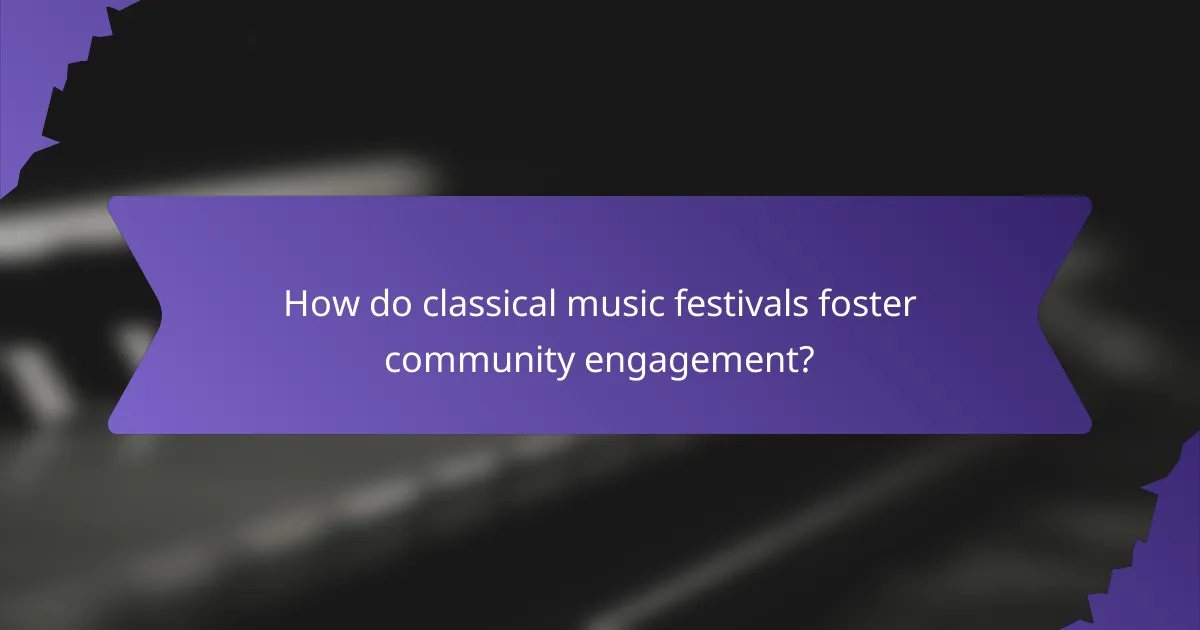
How do classical music festivals foster community engagement?
Classical music festivals foster community engagement by creating shared experiences and promoting cultural appreciation. These events encourage local participation, support regional artists, and strengthen social bonds through collaborative activities. Festivals often include educational programs that connect diverse audiences, enhancing understanding and enjoyment of classical music. As a result, they become vital platforms for community identity and cohesion.
What outreach initiatives are commonly implemented?
Common outreach initiatives for classical music festivals include community engagement programs, educational workshops, partnerships with local schools, social media campaigns, and collaborations with local artists. These initiatives aim to increase participation, enhance appreciation for classical music, and foster a sense of community. For example, educational workshops often target young audiences to introduce them to classical music in an interactive manner.
How do festivals cater to diverse audiences?
Classical music festivals cater to diverse audiences by offering varied programming, inclusive community engagement, and accessible venues. Festivals feature performances that span different genres, eras, and cultural influences, attracting a broad demographic. For instance, educational workshops and family-friendly events enhance participation. Additionally, innovative marketing strategies target diverse groups, ensuring that all community members feel welcome. This inclusivity fosters a rich cultural exchange and strengthens community ties.
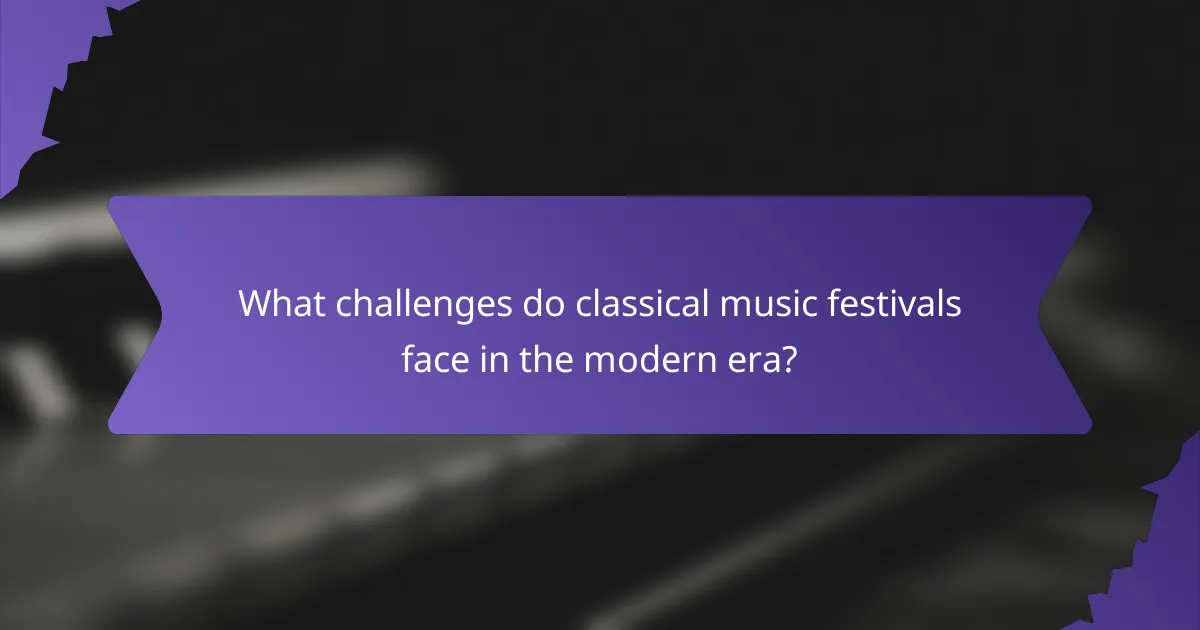
What challenges do classical music festivals face in the modern era?
Classical music festivals face challenges such as declining attendance, competition from other music genres, and funding issues. These festivals must adapt to changing audience preferences and incorporate technology to engage younger generations. Additionally, logistical hurdles like venue availability and artist scheduling complicate planning. The unique attribute of classical music festivals lies in their commitment to preserving musical heritage while innovating for modern audiences.
How do festivals adapt to technological advancements?
Festivals adapt to technological advancements by incorporating digital platforms, enhancing audience engagement, and improving logistics. For instance, many classical music festivals now offer live streaming and virtual attendance options, allowing global audiences to participate. Additionally, festivals utilize social media for marketing and audience interaction, creating a more immersive experience. Advanced ticketing systems streamline entry and reduce wait times, enhancing overall festival enjoyment. These adaptations not only broaden accessibility but also enrich the cultural experience of classical music festivals.
What are the common logistical issues encountered?
Classical music festivals often face logistical issues that can impact their success. Common challenges include venue selection, scheduling conflicts, artist availability, equipment logistics, and audience accessibility. These factors can complicate planning and execution, requiring careful coordination. For instance, securing a suitable venue may involve negotiating contracts and ensuring compliance with local regulations. Additionally, scheduling must accommodate various artists and performances, which can lead to conflicts. Efficient management of equipment transportation and setup is crucial to avoid delays. Lastly, ensuring that the festival is accessible to all audiences enhances participation and enjoyment.
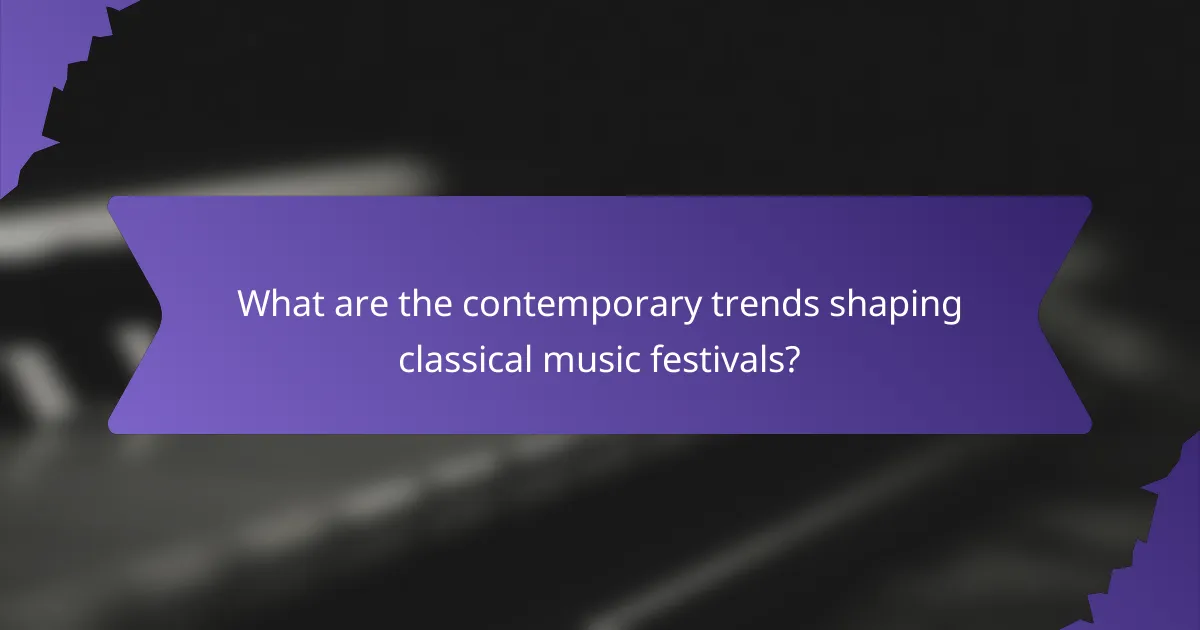
What are the contemporary trends shaping classical music festivals?
Contemporary trends shaping classical music festivals include diverse programming, innovative venues, and audience engagement strategies. Festivals now feature a mix of genres, collaborating with artists from various musical backgrounds. This approach attracts broader audiences and fosters inclusivity. Additionally, many festivals utilize unique locations, enhancing the overall experience and creating memorable atmospheres. Emphasis on interactive experiences, such as workshops and Q&A sessions, further engages attendees, making classical music more accessible and appealing. These trends reflect a shift towards modern celebrations that resonate with today’s audiences.
How is digital streaming changing festival participation?
Digital streaming is transforming festival participation by making classical music festivals more accessible. Audiences can now experience performances remotely, breaking geographical barriers. This shift allows for greater engagement with diverse programming and artists. Additionally, streaming platforms enable festivals to reach larger audiences, enhancing their visibility and impact in the classical music landscape.
Which new genres are being integrated into traditional festivals?
Classical music festivals are increasingly integrating genres like jazz, electronic, and world music. This fusion attracts diverse audiences and enhances cultural exchange. For instance, collaborations with contemporary artists broaden the appeal and create innovative performances. Such integration reflects the evolving landscape of classical music and its relevance today.
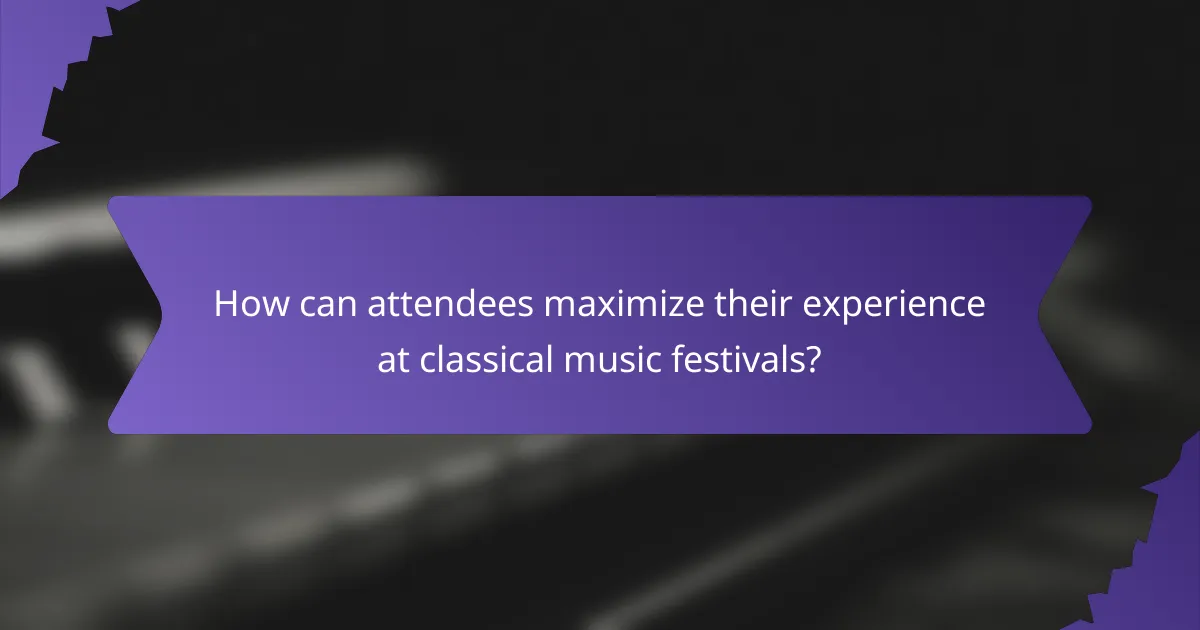
How can attendees maximize their experience at classical music festivals?
Attendees can maximize their experience at classical music festivals by engaging deeply with the performances and surrounding activities. Arriving early allows for exploration of the venue and participation in pre-concert talks.
Connecting with fellow attendees enhances the experience, fostering a sense of community. Exploring diverse programming, from solo recitals to orchestral performances, broadens appreciation for different styles.
Utilizing festival resources, such as guides or apps, provides insights into artist backgrounds and concert histories. Attendees should also consider attending workshops or masterclasses to deepen their understanding of classical music.
Lastly, maintaining an open mind about new compositions and interpretations enriches the overall experience, allowing for personal growth and enjoyment.
What tips can enhance festival enjoyment?
To enhance festival enjoyment, attendees should embrace planning, engagement, and exploration. First, researching the festival’s history and lineup can deepen appreciation. Second, participating in workshops or discussions fosters connection with artists and fellow attendees. Lastly, exploring the venue and surrounding area enriches the overall experience, offering unique insights and local culture.
What are common pitfalls to avoid during festival attendance?
Common pitfalls to avoid during festival attendance include poor planning, neglecting hydration, and overlooking personal safety. Attendees should research schedules, pack essentials, and remain aware of their surroundings.
1. Lack of preparation: Failing to check the festival schedule can lead to missing key performances.
2. Ignoring weather conditions: Not dressing appropriately for the weather can affect comfort and enjoyment.
3. Overindulgence: Consuming too much food or drink can lead to health issues.
4. Ignoring venue rules: Not adhering to the festival’s regulations may result in ejection or fines.
5. Neglecting personal belongings: Leaving valuables unattended increases the risk of theft.